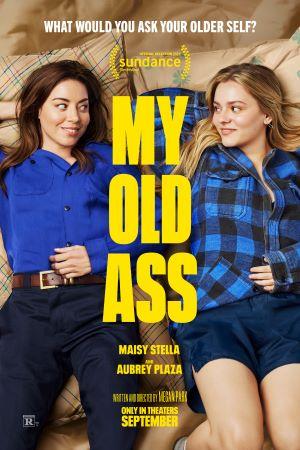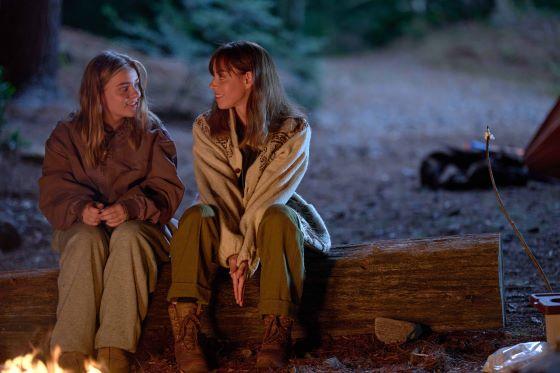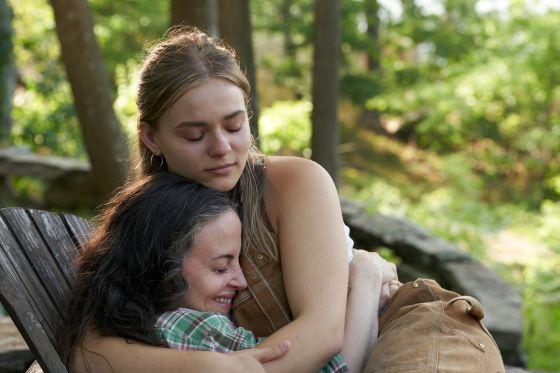

[Rating: Minor Rock Fist Up]
In Theaters Friday, September 20
A low-stakes time travel(ish) fable that scratches the “what if I could talk to my younger self” itch, My Old Ass excels when it explores the emotional tapestry of its lead and her family, only stumbling when it slows down long enough to contend with the details of its conceit. With no particular concern about the how’s or why’s of its larger framing device, the film leans instead on the emotional foundation underpinning the larger effort, largely getting away with it all. The final result feels a bit tidy and stretched from a shorter format, but the character work is solid and tells a compelling story with a decent balance of humor and humility.
Elliot (Maisy Stella) is celebrating her 18th birthday with two friends in the rural lakeside community where her family has a cranberry farm when the audience meets her. Excited about the magic mushrooms the trio has procured for an overnight camping trip, Elliott settles in for a psychedelic evening of good vibes and visuals when her 39-year-old self (Aubrey Plaza) appears and begins talking to her. Old Elliott (OE) doesn’t seem all that surprised to be there and in the middle of her younger self’s mushroom trip, but does have a considerable amount of perspective to share with the shocked 18-year-old version.
OE laments that Elliott doesn’t know how special this moment in life is, and that she should spend more time with her brothers and mom (Maria Dizzia). A crazy thing happens after the evening is over and the mushrooms have worn off, though: OE and Elliott continue to talk/text over the phone. Days removed from the psychotropic effects of her evening, Elliott continues to converse with OE about things that really matter and what’s to come, including a warning about a young man, Chad (Percy Hynes White), who appears not long after the mushroom trip.

Stella is a capable and compelling lead, and manages to keep the audience on her side through the rougher (earlier) portion of her character’s journey so that her growth has the desired impact. The smaller moments that portray the mundane awkwardness of a parent-teenager relationship are some of the best in the picture, with one early on between Elliott and her mother painting a full picture of an established dynamic in just 2 minutes. The pensive yet hopeful posture Dizzia takes when trying to connect with Elliott early in the film tells the audience exactly who both these women are and allow My Old Ass to tell the (mostly) complete story it does in a tidy 88 minutes.
Writer/director Megan Park is perhaps best known to audiences for her 2021 debut feature, The Fallout, which explored survivor trauma related to a fictional high school shooting. Like that movie, My Old Ass is interested in the emotional journey of a young adult who may not be world-wise, yet has enough sense to understand how valid and consequential feelings are at that age. Both movies lend credence to the idea that all emotions, no matter how immature or underdeveloped, carry the same weight and demand exploration to get to the next step of personal evolution.
Park’s newest effort makes this more explicit with two versions of the same person essentially arguing through this concept, with the script seemingly content to bypass the logistics of the “how” in favor of the “why.” And while explaining how all of this works might not be essential to the story Park is trying to tell, the refusal to seriously address this vital component of the narrative makes it hard for the audience to return the favor for the movie writ large. A quibble to some, perhaps, but the emotional and literal climax of My Old Ass crashes into this dilemma head-on without any further clarification or resolution, further confusing what has/is happened/happening up to that point.

The frequent use of long, wide shots of the lake and surrounding forest create a tangible sense of place for the story, yet Park’s use of the camera is largely utilitarian and practical in nature. My Old Ass doesn’t utilize much in the way of framing devices or color schemes to augment the story it tells, and despite solid performances from all members of the cast, it is very much a story-forward effort. Luckily for Park and the film, however, the story is solid and Stella, Plaza, Dizzia, and company make a meal out of it.
An entertaining trifle that succeeds more than it fails, particularly when it explores the genuine awkwardness and confusion of young adulthood, My Old Ass taps into a familiar idea in a brand new way. Far better through its first two acts than its last, where it must contend with the particulars of its conceit, the movie succeeds in equal measure to the narrative grace afforded by each viewer. The longer a person squints, the more cracks appear around the edges of the story, but at 88 minutes, it all moves fast enough that there’s little time for that (much like the vanishing youth OE keeps talking about).





Comments on this entry are closed.